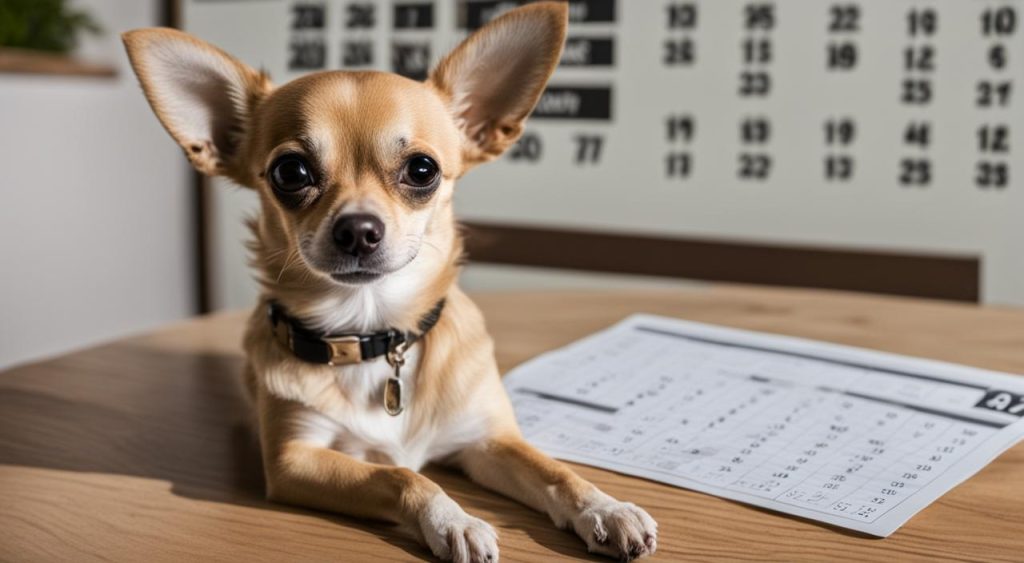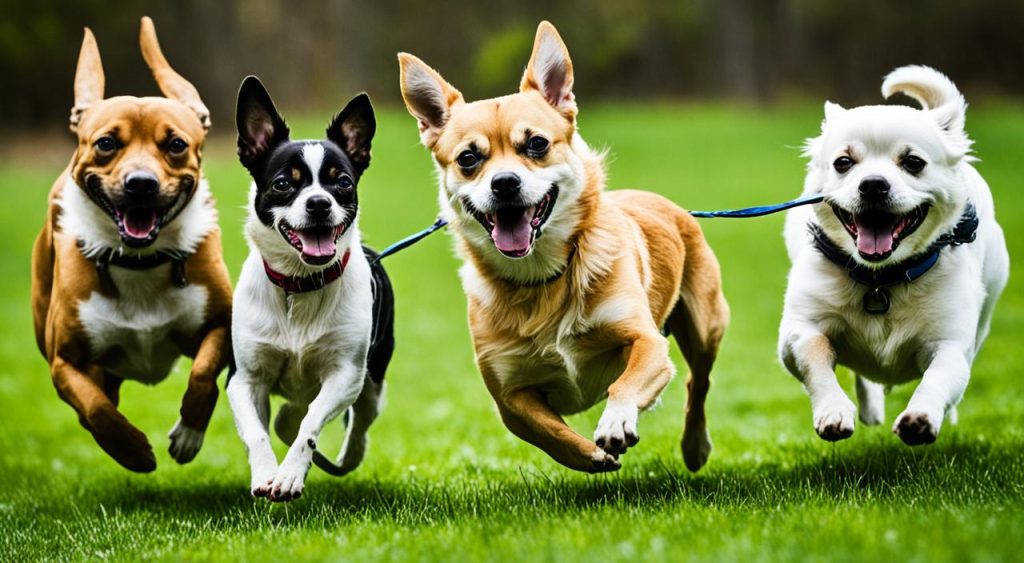Chihuahuas, known for their small size and big personalities, go through various stages of development that impact their behavior and energy levels. If you’re wondering when these tiny pups calm down, it’s essential to understand their maturity process and how it affects their temperament.
Chihuahuas are at their most energetic in their first year of life, which is considered puppyhood. During this stage, they exhibit playful and sometimes hyperactive behavior, making them a bundle of energy. However, as they reach adulthood, their energy levels may gradually decrease. This decrease continues as they enter their senior years.
Chihuahuas are generally considered adults at around one year old and seniors at approximately age ten. It is important to fulfill their energy needs through exercise, training, and playtime at all stages of their life to ensure their overall well-being.
Key Takeaways:
- Chihuahuas are most energetic during puppyhood and gradually calm down as they reach adulthood.
- They are generally considered adults at one year old and seniors at around age ten.
- Regular exercise, training, and playtime are essential to meet their energy needs at all stages of life.
- Chihuahuas’ energy levels may vary depending on factors such as health, genetics, and personality.
- Proper care, training, and socialization are crucial for their healthy development and behavior.
Chihuahua Energy Levels and Behavior Changes Throughout Life
Chihuahuas are known for their dynamic energy levels, which can vary throughout their life span. Several factors, such as their stage in life, health, genetics, and personality, contribute to these fluctuations. Understanding how Chihuahuas’ energy levels change can help you effectively manage their behavior and provide the care they need.
During their puppy year, Chihuahuas exhibit peak energy levels. They are playful, curious, and full of boundless energy. However, as they enter their teenage years and progress into adulthood, their energy gradually starts to calm down. As they reach their senior years, their energy levels decline further, and they become more inclined towards relaxation.
Despite the decrease in energy levels, it is crucial to provide Chihuahuas with regular exercise, training, and playtime to maintain their mental and physical well-being. Engaging them in activities that stimulate their body and mind can help manage their energy levels and prevent behavioral issues.
“Keeping your Chihuahua physically active and mentally stimulated not only improves their overall health but also helps curb any behavioral problems that may arise due to pent-up energy.”
Maintaining a consistent exercise routine allows Chihuahuas to burn off excess energy and reduces the likelihood of destructive behaviors. Walking, playing fetch, or participating in agility training can help channel their energy in productive ways. Additionally, mental stimulation through interactive toys, puzzle games, and training sessions can keep their curious minds engaged.
As Chihuahuas age, their energy needs may change. It is important to assess their energy levels and adapt their exercise and training routines accordingly. The key is to find a balance that provides enough physical activity to keep them fit and healthy while considering their maturity and potential health concerns.
In summary, Chihuahuas undergo significant changes in energy levels as they progress through different stages of life. Understanding and addressing these changes with appropriate exercise, training, and mental stimulation is essential for their well-being. By managing their energy levels and providing the right outlets for their behavior, you can ensure a happy and balanced Chihuahua companion.
Chihuahua Training and Exercise Tips for Managing Energy
To effectively manage your Chihuahua’s energy levels and behavior, establishing a consistent training routine and providing regular exercise is crucial. Going for walks, engaging in training sessions, and playing games can help drain any excess energy your Chihuahua may have while providing them with essential mental stimulation. It’s important to tailor the exercise and training to suit their energy levels and unique temperament.
Starting their training from a young age and continuing throughout their life is key to ensuring they remain well-behaved and mentally stimulated. Chihuahuas are highly intelligent and responsive, making them eager to learn new commands and tricks. Incorporating positive reinforcement methods, such as treats and praise, can further motivate them during training sessions.
“Consistency is key when training your Chihuahua. Be patient, persistent, and use positive reinforcement to reinforce desired behaviors.”
Training shouldn’t be limited to basic obedience commands; it should also encompass crucial socialization experiences. Exposing your Chihuahua to different people, animals, and environments at an early age can help them develop a well-rounded temperament and prevent any behavioral issues that may arise due to fear or anxiety.
Remember, Chihuahuas have their own unique personalities, so it’s important to be patient and understanding of their individual needs and capabilities. Pushing them too hard or overwhelming them with excessive training can have negative effects on their behavior and overall well-being.
Exercise Tip: Interactive Toys and Games
Integrating interactive toys and games into your Chihuahua’s exercise routine can provide mental stimulation and burn off excess energy. Puzzle toys that require problem-solving skills can keep your Chihuahua entertained and mentally engaged. Additionally, playing games such as fetch or hide-and-seek can help channel their energy in a positive way while strengthening the bond between you and your furry companion.
By following these training and exercise tips, you can effectively manage your Chihuahua’s energy levels, promote positive behavior, and ensure they lead a happy and fulfilling life.
Chihuahua Age Milestones and Developmental Changes
Chihuahuas go through various age milestones and developmental changes as they grow. From being newborns with closed eyes to becoming puppies with emerging teeth, they experience rapid growth and development. During their teenage phase, which typically occurs around 10-16 weeks, Chihuahuas may exhibit increased energy and rebellion as they explore their surroundings and assert their independence.
As Chihuahuas approach adulthood, usually around one year old, they start to calm down and settle into their mature behavior patterns. They become more aware of their place within the home hierarchy and tend to develop a more stable temperament.
It is crucial to provide appropriate care, training, and socialization during each stage of a Chihuahua’s development to ensure their healthy growth and well-being. This includes ensuring they receive proper nutrition, veterinary care, and regular exercise to support their physical and mental development. Additionally, early training and socialization can help shape their behavior and ensure they become well-adjusted and obedient adults.
Managing a Chihuahua’s Energy and Behavior
Managing a Chihuahua’s energy and behavior requires a structured routine and targeted training techniques. By understanding their unique temperament and behavior changes, you can create an environment that promotes calmness and obedience.
Creating Structure: Establish a consistent daily routine for your Chihuahua. This includes regular feeding, exercise, and playtime. Consistency helps reduce boredom and provides a sense of security for your dog.
“Chihuahuas thrive on routine and feel more secure when they know what to expect,” says Dr. Emily Roberts, a veterinarian specializing in small dog breeds.
Training and Socialization: Train your Chihuahua using positive reinforcement techniques. Keep training sessions short and engaging, focusing on commands such as sit, stay, and leash walking. Socialize your Chihuahua with other dogs and people to help them develop good manners and proper behavior.
“Training not only teaches them basic obedience skills but also helps redirect their energy in positive ways,” advises professional dog trainer, Sarah Thompson.
Exercise Routine: Chihuahuas have varying energy levels at different life stages. During their high-energy puppy years, provide them with plenty of playtime and short bursts of exercise. As they age and their energy levels decrease, adjust their exercise routine to prevent them from becoming overweight and to support their overall health and well-being.
Training Timelines
Puppyhood: Begin training your Chihuahua as early as possible. Use positive reinforcement and reward-based training methods to instill good behaviors and establish yourself as the leader.
Teenage Years: As your Chihuahua enters their teenage phase, they may exhibit increased energy and rebellion. Consistent training and boundaries will help navigate through this stage.
Adulthood: By the time your Chihuahua reaches adulthood, they should have mastered basic obedience commands and developed good manners. Continue training to keep their minds sharp and prevent behavioral issues.
Senior Years: As your Chihuahua becomes a senior, their energy levels will naturally decrease. Adjust their exercise routine accordingly, focusing on low-impact activities to keep their muscles strong and joints healthy.
In managing a Chihuahua’s energy and behavior, patience and positive reinforcement are key. By providing a structured routine, consistent training, and appropriate exercise, you can ensure a calm and loving companion for years to come.
Conclusion
Chihuahuas, like any other dog breed, go through various stages of development and behavior changes throughout their life. Understanding these stages and providing appropriate care and training is crucial in managing their energy levels and behavior patterns.
During their puppy years, Chihuahuas have the highest energy levels and require plenty of exercise, training, and playtime to channel their energy in positive ways. As they grow and mature, their energy gradually decreases and they begin to settle down. However, it is important to continue providing them with regular exercise and mental stimulation to ensure their overall well-being.
By establishing a consistent training routine and socializing them from a young age, you can help shape their behavior and prevent common issues such as excessive barking or aggression. Adjusting their exercise and training timelines according to their age and energy levels is also essential in maintaining a well-behaved and happy Chihuahua companion.
Remember, Chihuahuas may have their own unique temperament and behavior patterns, so it’s important to be patient and understanding throughout their development stages. With proper care, training, and attention, you can enjoy a harmonious and fulfilling bond with your Chihuahua for many years to come.





